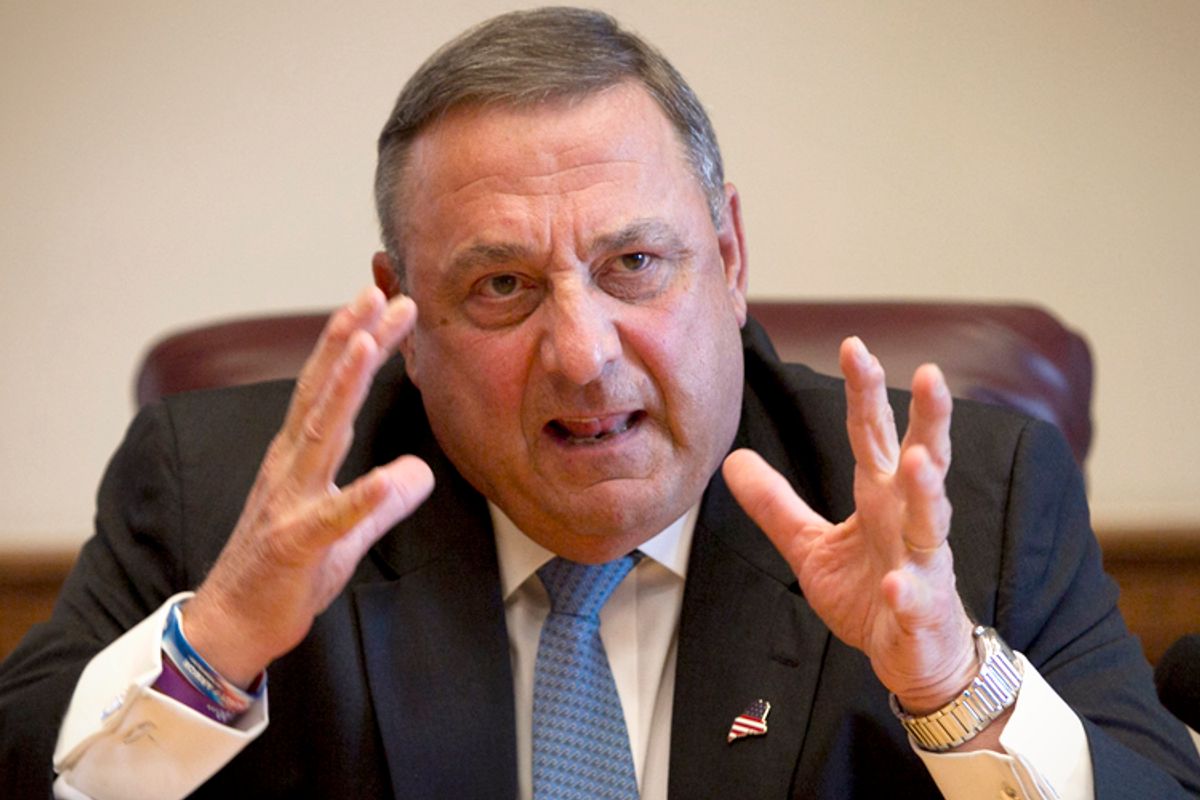Maine's Tea Party governor, Paul LePage — aka "America's craziest governor" — is set to nix a law that would increase access to lifesaving anti-overdose medication because he believes, without justification and despite the protestations of experts, that to do so would encourage further use of illegal drugs.
According to the Huffington Post, LePage doesn't want to make it easier for people to obtain Naloxone, a drug that reverse an overdose from heroin or other opiates, even though fatal overdoses in his state quadrupled in the period between 2011 and 2012.
A Democratic state representative named Sarah Gideon has sponsored a bill to give Naloxone (known commercially as Narcan) to firefighters, police and at-risk users and their families. Gideon told HuffPo that LePage's chief health policy adviser communicated to her that LePage would oppose the bill.
"His main objection is his belief — and I have to emphasize 'his belief' because there is no evidence that supports this at all — is [his] belief that increasing the availability of Narcan or naloxone will lead the drug user or drug abuser to have this feeling of invincibility," Gideon said of LePage.
"If you want to change someone's behavior and really reduce the harm, you need to be able to save their life first," she went on to say. "It's that simple. Unless you believe that somebody who is using a drug should die because of their choice, I don't see how you can object to putting Narcan in the hands of more people."
LePage's spokesman has said that the governor does not comment on bills until they reach his desk, but HuffPo notes that a bill similar to Gideon's was vetoed by LePage in 2013. At the time, LePage defended his veto by saying the bill "would make it easier for those with substance abuse problems to push themselves to the edge, or beyond. It provides a false sense of security that abusers are somehow safe from overdose if they have a prescription nearby."
LePage's assertions are not supported by current medical research.
Karla Wagner, an assistant professor at the University of California San Diego's School of Medicine, studied a program on Los Angeles' Skid Row that taught intravenous drug users how to administer naloxone. Her research concluded that knowing more about the overdose treatment did not encourage drug users to use more. Instead, it appeared to do the opposite. More than half of those who went through the program actually reported decreased drug use at a follow-up interview, Wagner's study found.
In 2010, police and firefighters in Quincy, Mass., started carrying naloxone as part of their standard equipment -- a scenario similar to that envisioned in Gideon's bill. Since then, naloxone has been credited with reversing 188 overdoses in Quincy alone, and the head of the Boston suburb's police narcotics unit has become a naloxone evangelist.
In general, Massachusetts communities with overdose awareness and naloxone distribution programs had reduced overdose death rates compared to those without, a 2013 study found.

Shares